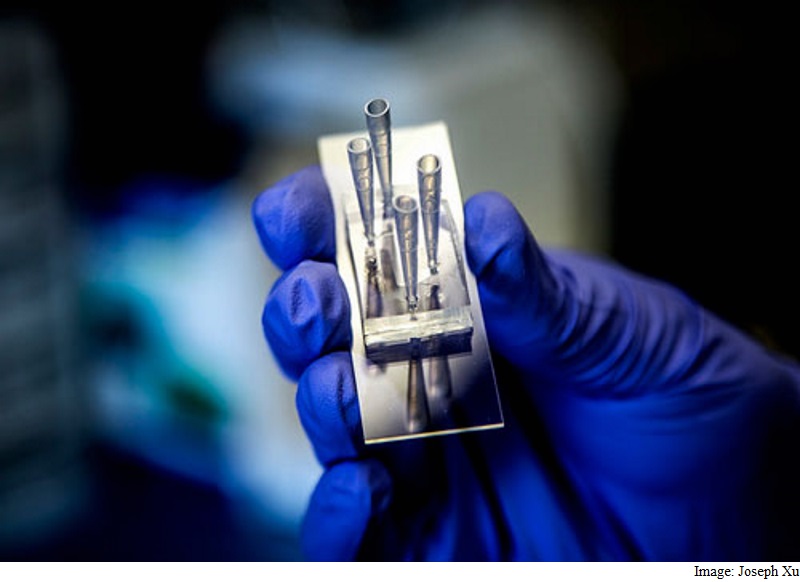- Home
- Science
- Science News
- 'Kidney on a Chip' Device Enables Safer Drug Dosing: Study
'Kidney on a Chip' Device Enables Safer Drug Dosing: Study

"When you administer a drug, its concentration goes up quickly and it's gradually filtered out as it flows through the kidneys," said one of the researchers Shuichi Takayama, professor at University of Michigan in the US.
"A kidney on a chip enables us to simulate that filtering process, providing a much more accurate way to study how medications behave in the body," Takayama noted.
Precise dosing in intensive care units is critical, as up to two-thirds of patients in the ICU experience serious kidney injury.
Medications contribute to this injury in more than 20 percent of cases, largely because many intensive care drugs are potentially dangerous to the kidneys.
Determining a safe dosage, however, can be surprisingly difficult. Today, doctors and drug developers rely mainly on animal testing to measure the toxicity of drugs and determine safe doses.
But animals process medications more quickly than humans, making it difficult to interpret test results and sometimes leading researchers to underestimate toxicity.
The new technique offers a more accurate way to test medications, closely replicating the environment inside a human kidney.
It uses a microfluidic chip device to deliver a precise flow of medication across cultured kidney cells.
"Even the same dose of the same drug can have very different effects on the kidneys and other organs, depending on how it's administered," Sejoong Kim, associate professor at Seoul National University Bundang Hospital in South Korea.
"This device provides a uniform, inexpensive way to capture data that more accurately reflects actual human patients," Kim noted.
In the study, the team tested their approach by comparing two different dosing regimens for gentamicin, an antibiotic that is commonly used in intensive care units.
They found that a once-daily dose of the medication is significantly less harmful than a continuous infusion - even though both cases ultimately delivered the same dose of medication.
The findings appeared in the journal Biofabrication.
Get your daily dose of tech news, reviews, and insights, in under 80 characters on Gadgets 360 Turbo. Connect with fellow tech lovers on our Forum. Follow us on X, Facebook, WhatsApp, Threads and Google News for instant updates. Catch all the action on our YouTube channel.
Related Stories
- Samsung Galaxy Unpacked 2025
- ChatGPT
- Redmi Note 14 Pro+
- iPhone 16
- Apple Vision Pro
- Oneplus 12
- OnePlus Nord CE 3 Lite 5G
- iPhone 13
- Xiaomi 14 Pro
- Oppo Find N3
- Tecno Spark Go (2023)
- Realme V30
- Best Phones Under 25000
- Samsung Galaxy S24 Series
- Cryptocurrency
- iQoo 12
- Samsung Galaxy S24 Ultra
- Giottus
- Samsung Galaxy Z Flip 5
- Apple 'Scary Fast'
- Housefull 5
- GoPro Hero 12 Black Review
- Invincible Season 2
- JioGlass
- HD Ready TV
- Laptop Under 50000
- Smartwatch Under 10000
- Latest Mobile Phones
- Compare Phones
- OPPO A6v 5G
- OPPO A6i+ 5G
- Realme 16 5G
- Redmi Turbo 5
- Redmi Turbo 5 Max
- Moto G77
- Moto G67
- Realme P4 Power 5G
- HP HyperX Omen 15
- Acer Chromebook 311 (2026)
- Lenovo Idea Tab Plus
- Realme Pad 3
- HMD Watch P1
- HMD Watch X1
- Haier H5E Series
- Acerpure Nitro Z Series 100-inch QLED TV
- Asus ROG Ally
- Nintendo Switch Lite
- Haier 1.6 Ton 5 Star Inverter Split AC (HSU19G-MZAID5BN-INV)
- Haier 1.6 Ton 5 Star Inverter Split AC (HSU19G-MZAIM5BN-INV)

















